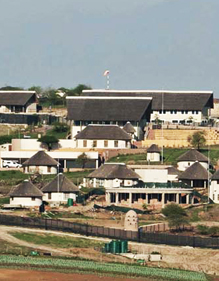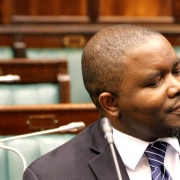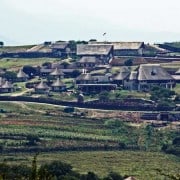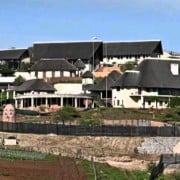|
Getting your Trinity Audio player ready...
|
 By now it is well known that the Department of Public Works has invoked the apartheid-era National Key Points Act in an attempt to frustrate a probe into the budgeted R203-million upgrade to President Jacob Zuma’s Nkandla homestead, the Right2Know coalition reports.
By now it is well known that the Department of Public Works has invoked the apartheid-era National Key Points Act in an attempt to frustrate a probe into the budgeted R203-million upgrade to President Jacob Zuma’s Nkandla homestead, the Right2Know coalition reports.
“It is the latest in a long history of strategic abuse of this draconian law to undermine the public’s right to know,” it adds.
“The National Key Points Act provides wide-ranging and seldom-scrutinised powers to the minister of police to arbitrarily declare all sorts of places – from the president’s home to the Durban harbour – as national key points where Constitutional rights to freedom of expression and access to information are all severely restricted or no longer apply.
“The Right2Know Campaign believes that in all probability this law is unconstitutional and has provided too much cover to politicians and officials who want to abuse ‘national security’ imperatives to protect themselves and their actions from public scrutiny.
“In fact, the law has been so widely and secretly employed since 1994 that it is virtually impossible for the general public to know which places have been declared national key points. The practical effect of this is that the full list of key points has itself, become a secret!
“However, we do have the Promotion of Access to Information Act (Paia) and it is under this law that the Right2Know campaign, on 4 October, launched an access to information request for the minister of police to reveal the list of national key points across South Africa. Making this list publicly available will be the first step in challenging the misuse of this overly broad national security law.
In terms of Paia, the police must respond within 30 days.
How the National Key Points Act undermines the public’s right to know:
What do OR Tambo International Airport, President Zuma’s homestead in Nkandla, and the Koeberg Nuclear Power Station have in common?
They have all been declared national key points in terms of the National Key Points Act, an obscure piece of apartheid-era law still on South Africa’s statute books.
Introduced in 1980 as a response to “sabotage” in Umtata, the law centralised a vast number of arbitrary powers in the defence minister with little oversight or accountability.
The Act allowed the minister to designate any area or place – from a fuel depot or electricity substation to the country’s parliament – to be vital to national security and in need of special security. The also law provided lucrative and highly sought-after contracts for private security companies.
Today, the National Key Points Act remains on our statute book, giving the head of the South African Police Service – and until 2004, the minister of defence – the power to declare any place a national key point if it is deemed vital to national security.
Once a site is declared a national key point, it is governed by strict anti-disclosure provisions: any person disclosing “any information” in “any manner whatsoever” about security measures of a national key point can face up to three years in jail or a R10 000 fine.
There is no public interest defence for whistleblowers, and historically the National Key Points Act has been used and abused to stifle access to information.
For example in 2006, the Department of Public Works used the Act to prevent information from being disclosed to the public about an alleged R90-million wall around President Mbeki's official residence in Pretoria.
However, the National Key Points Act has been used to prevent accountability in the private sector as well: for example, activists in Durban have a long-running struggle to get information from the Engen Refinery in south Durban – although there are many concerns about the environmental risks posed by the refinery, its status as a national key point has been used to block requests for information, and photographers trying to document environmental hazards at the site have been chased away.
The National Key Points Act also undermines the right to assembly, and has been used to shut down lawful protests – in 2003, police arrested 36 transport workers for demonstrating outside Cape Town International Airport (a national key point) during a Satawu strike, and in 2007 the Treatment Action Campaign was denied the right to hold a protest near the Reserve Bank building.
Finally, the minister can appoint “such persons as he may consider necessary to assist him in the performance of his functions in terms of this Act,” including “any officer of any department of state or provincial administration.” This allows the Act allows the minister to share his draconian powers without check.
Yet there is no publicly published list of national key points! Instead, the National Key Points Act is used to obscure potentially embarrassing information from the public and to dampen peaceful protest and freedom of assembly.
R2K has launched a PAIA request to SAPS for records indicating all National Key Points or National Key Points Complexes and for bank statements of the Special Account for the Safeguarding of National Key Points. In terms of PAIA, SAPS must provide a response within 30 days.
Text courtesy of Right2Know







